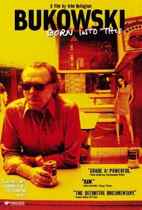 [vc_widget_sidebar sidebar_id=”sidebar-sidebar-reviews”]
[vc_widget_sidebar sidebar_id=”sidebar-sidebar-reviews”]
Bukowsky: Born Into This
2003
Director:
Starring: Directed by John Dullaghan
Reviewer:
Genre: Non Asian Movie Reviews
Rating:
Starring: Bono, John Bryan, Linda Lee Bukowsky, Marina Bukowski
130 minutes
Reviewed by Clement von Franckenstein
Rating (a 1 6 scale): 5


As a child Bukowski suffered from severe “Acne Vulgaris, probably bought on by the trauma of being beaten almost every day from the age of 8 through 14 by his father. It would scar him forever (“I felt as if no woman would ever want to be with me. I saw myself as some kind of a freak). He did not have relations with a woman till he was 24. However when he drank alcohol, the pain disappeared, he felt emboldened to stand up to his father, and eventually, aged 19, knocked him out with a single punch and ran away from home.

When he was in 5th grade he wrote an essay about attending President Hoover’s visit to a park in Los Angeles, which he invented. It was judged by far the best essay, and he knew he had found his vocation. Besides immersing himself in alcohol to ease his pain, he spent hours in the local library reading Sinclair Lewis, Hemingway, Saroyan, Carson McCullers and John Fante then little known, who would become his good friend. He also dipped into Gorky, Rabelais, Tolstoy, Shakespeare, e.e. cummings, D.H.Lawrence, Steinbeck, Kant, Nietzsche, Maupassant, Ezra Pound and ancient Chinese Poets. Those were the writers who most influenced his early apprenticeship.

The young director Taylor Hackford, now an established film-maker, made a documentary about Bukowski in grainy black and white, when he was starting to be famous, but was still living in a small house in Los Angeles, and doing the night shift as a sorter at the Post Office. Many clips are shown in this film, and they show Hank driving around Hollywood in his old car and reminiscing about his early life, talking about leaving the Post office and then getting re-hired, and being interviewed by several European journalists after his books and fame had spread abroad. We are also treated to him reading his own poems drunk (including throwing up back stage) to a heckling audience, and giving back as good as he gets!
In many ways this film reminds me of Terry Zwigoff’s brilliant award-winning documentary Crumb (one of my all time favorites), which follows the life and career of the brilliant eccentric cartoonist who created Fritz the Cat, and how he survived a monstrous childhood at the hands of a vile father by burying himself in his art. He also found love and companionship with a fellow artist, fathered a daughter and had a fairly normal family life.
Similarly Bukowski similarly survived his sadistic father through his writing, which was both his therapy and salvation. In 1976, aged 64, he met Linda Lee Beighle who was 32. She was an ex-hippie, and devotee of guru Meher Baba. He spent the last 18 years of his life with her and they married in 1985 after a slowly maturing relationship. In 1963 Hank fathered his only child, Marina, by Frances Smith one of several admirers with whom he had casual affairs. He maintained a very special relationship with his daughter although he rarely wrote about her. In 1970 when he was 49, Bukowski wrote his first novel, Post Office, for his mentor and publisher John Martin (who had put him on a salary of $100 a month). He had by then been working at the Post Office for eighteen years. He wrote 120,000 words (later cut to 90,000) in a kind of trance over 18 days! Like almost all of his work it was auto biographical, settling old scores with the alienating world of work. In the remaining 24 years of his life, Bukowski would publish 45 books in succession, almost without a break!
His third, longest (433 pages divided into 99 chapters) and most unstructured novel was Women, written in 1978. It tells of his relationships with 20 or so women of all kinds after four years of celibacy (“Love is ridiculous because it can’t last. Sex is ridiculous because it doesn’t last long enough.). By then he had met Linda and she slowly settled his life down.

Charles Bukowski died on March 9th, 1994 aged 73. Earlier that year he had said, “If I stop writing I am dead. And thats the only way I’ll stop: dead. As often happens to great men, he died more famous for his personality than for his work. He once said, “I am 93% the person I present in my poems; the other 7% is where art improves upon life, call it background music.
How much of that 93% was Dirty Old Man or genius, bravado or brutal honesty, the viewer of this excellent film must decide. It is an uncompromising look at a great artist “warts and all.
